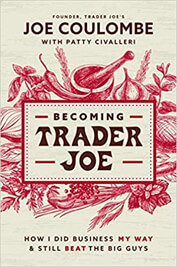 Review by Myra Salzer
Review by Myra Salzer
It isn’t clear to me why I picked up this book or why I decided to read it when I did. It’s been a while since my last book review, not because I haven’t been reading, but because there were several in a row that I didn’t feel worthy of sharing. Becoming Trader Joe finally broke that streak in spite of the fact that I have absolutely no interest in the grocery business. Nonetheless, I learned a lot about it, and I will forever enter grocery stores with a sense of respect, wonder, and awe. Simple (seemingly obvious) logistical challenges such as how deliveries and store shelves require four separate temperatures come to mind, not to mention sell-by and use-by dates of varying packaging. And then all the governmental interference with each state, and sometimes each county and city having its own regulations. Yikes! Who has the patience for that?!
Trader Joe’s was Coulombe’s third venture (after Pronto Markets and Rexall) and he started in Southern California with a single-minded focus: To provide value to over-educated, under-paid professionals (think teachers, nurses, musicians). He stuck to that mission throughout his years as CEO, until 1988 when he retired. Every business decision was made with that single focus. He never insulted the intelligence of his customers by running weekly specials or stocking goods that one could get anywhere (Cheerios™, Kleenex™, Wonder Bread™, you get the idea). He started with wines (allowed in California grocery stores). Trader Joe’s was known for stocking the shelves with good wines for far less than shoppers could get elsewhere. It was also committed to healthy, often organic, real foods. They made and sold their own baked goods, and they had their own distribution system.
Coulombe didn’t have many complimentary things to say about traditional grocery chains. He did have a great respect for how Costco was managed. Both Costco and Trader Joe’s are not afraid to cycle merchandise if it is out of season or not profitable. Personally, I am still lamenting the loss of Trader Joe’s’ orange vinegar. It was so good! They no longer stock it. The employee I asked didn’t know if the item was cyclical or lacking demand.
And speaking of employees, Coulombe paid above-average wages, which effectively eliminated employees’ desire to unionize. He also didn’t define specific jobs, e.g., checker, stocker, customer service, etc. Trader Joe’s’ employees roam from one department to another so they never get tired of, or feel inferior to, others in different departments. As a result, turnover is much lower than the industry standard.
The only rub I had about Joe was that he always just happened to let it slip that he went to Stanford. Instead of sharing a story about a college roommate, he was a Stanford roommate. Instead of describing his wife Alice as a college sweetheart, she was a Stanford sweetheart. And when he hired a lawyer, he happened to mention the lawyer was a fellow Stanford alum. Aargh!
Ever since I started TWC, my focus has been: Do what is best for our clients. Becoming Trader Joe validated my decision to run the company with that single focus. Every decision any of us makes comes down to exactly that.